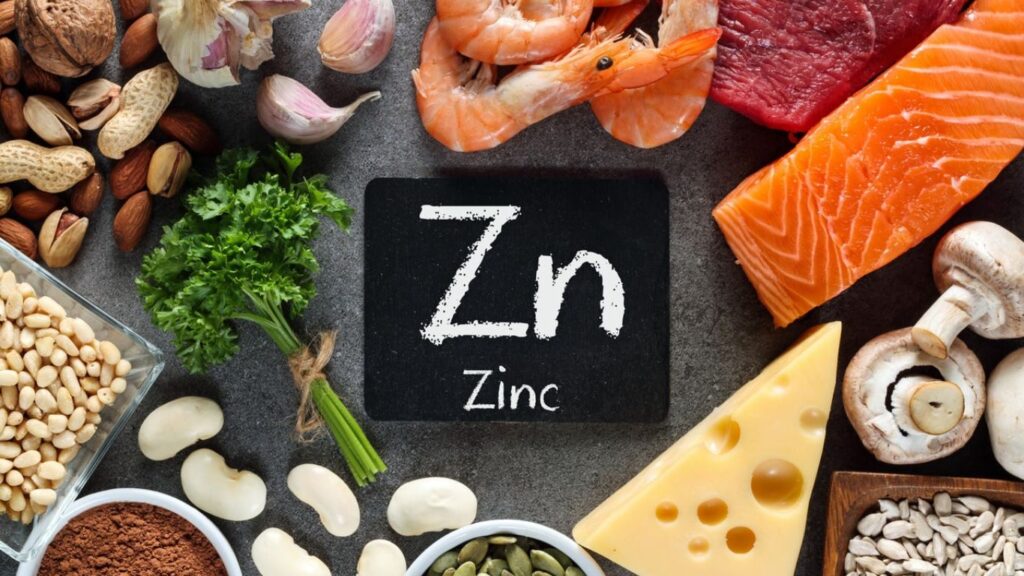Zinc, an essential trace mineral, plays a pivotal role in numerous aspects of human health. It is crucial for the proper functioning of over 300 enzymes and is involved in various metabolic processes. Zinc’s importance extends to the synthesis of DNA, protein production, wound healing, and growth during childhood, adolescence, and pregnancy. One of zinc’s most notable roles is in bolstering the immune system; it is fundamental in maintaining immune function, reducing the risk of infection, and supporting systemic immune response. Adequate zinc levels contribute to a balanced immune response, potentially mitigating the severity and duration of infectious diseases. Beyond its immune-enhancing properties, zinc contributes to skin health, DNA synthesis, and cellular metabolism, highlighting its broad impact on overall health. Ensuring sufficient zinc intake, whether through diet or supplementation, is essential for maintaining these vital bodily functions and promoting general well-being.
Unlocking the Power of Zinc: How It Boosts Immunity and Overall Health
The Essential Role of Zinc in the Human Body
Zinc in Immune Function:
- Cell-Mediated Immunity: Zinc is vital for the development and function of immune cells, particularly T lymphocytes. It helps in the maturation and differentiation of these cells, which are crucial for the adaptive immune response.
- Antioxidant Properties: Zinc acts as an antioxidant, protecting cells from oxidative stress by catalyzing the action of antioxidant enzymes and scavenging reactive oxygen species (ROS), thereby reducing inflammation and cellular damage.
Zinc in Cell Growth and Repair:
- DNA Synthesis and Function: Zinc plays a critical role in DNA synthesis and repair, ensuring genetic stability and the proper function of the replication process.
- Protein Production: It is involved in transcription and translation, the processes by which proteins are made, impacting cellular function and structural integrity.
- Cell Division: Zinc is essential for cell division, supporting growth and the replacement of damaged cells, which is particularly important for wound healing and development.
Zinc’s Role in Enzymatic Reactions:
- Catalyst in Enzymatic Processes: Zinc acts as a co-factor for over 300 enzymes, influencing various biochemical processes including digestion, metabolism, and nerve function.
- Metabolic Function: By participating in enzymatic reactions, zinc plays a significant role in carbohydrate, lipid, and protein metabolism, affecting energy production and utilization.
- Detoxification: Zinc-dependent enzymes are involved in detoxifying substances, helping to neutralize toxins and protect the body from harmful compounds.
Recognizing Zinc Deficiency: Symptoms and At-Risk Groups
Symptoms of Zinc Deficiency:
- Impaired Immune Response: Reduced ability to fight off infections and illnesses due to weakened immune system function.
- Hair Loss: Noticeable thinning or loss of hair, which can be a direct consequence of insufficient zinc levels.
- Delayed Wound Healing: Slower recovery from cuts, abrasions, and wounds, reflecting zinc’s crucial role in skin integrity and cell repair.
- Taste Abnormalities: Changes or reductions in taste sensation, potentially leading to decreased appetite and nutritional deficiencies.

At-Risk Populations for Zinc Deficiency:
- The Elderly: Due to factors like reduced dietary intake, less efficient zinc absorption, and potential interactions with medications.
- Vegetarians: Plant-based diets can be lower in bioavailable zinc compared to diets including meat, a rich source of zinc.
- Pregnant and Breastfeeding Women: Increased zinc requirements during pregnancy and lactation may not be met without careful dietary planning or supplementation.
- Individuals with Certain Health Conditions: Conditions like gastrointestinal diseases (e.g., Crohn’s disease, ulcerative colitis) and genetic disorders affecting zinc absorption can increase the risk of deficiency.
The Benefits of Zinc for Immunity and Health
Boosting Immune Resilience:
Adequate zinc levels are fundamental in enhancing the body’s resistance to infections and diseases. Zinc is crucial for the development and function of immune cells, particularly T-lymphocytes, which play a key role in the body’s defense against pathogens. By regulating immune responses, zinc helps reduce the duration and severity of infectious diseases, demonstrating its vital role in maintaining immune resilience.
Impact on Chronic Diseases and Conditions:
Research has increasingly highlighted the link between optimal zinc status and a reduced risk of chronic diseases. For instance, zinc’s anti-inflammatory and antioxidant properties can mitigate oxidative stress, a contributor to the development of cardiovascular disease. Similarly, adequate zinc levels are associated with improved insulin sensitivity, potentially lowering the risk of type 2 diabetes. These findings underscore zinc’s significance not just in preventing infections but also in reducing the prevalence and severity of chronic health conditions.
Mental Health and Cognitive Functions:
Beyond its physical health benefits, zinc plays a crucial role in brain health, influencing mental health and cognitive functions. Zinc is involved in neurotransmitter regulation and synaptic function, which are essential for cognitive processes and mood regulation. Studies suggest that adequate zinc levels can improve cognitive performance and may have a protective effect against depression and anxiety. This highlights the broader implications of zinc in supporting not only the body’s physical well-being but also mental health and cognitive agility.
Zinc Supplementation: How to Do It Right
When Supplementation is Needed:
Zinc supplementation may be necessary for individuals who are unable to meet their daily zinc requirements through diet alone. This includes people with gastrointestinal diseases that impair zinc absorption, vegetarians and vegans who consume fewer bioavailable zinc sources, pregnant and breastfeeding women with increased zinc needs, and the elderly who may have limited dietary variety. Additionally, those with a diagnosed zinc deficiency or conditions that increase zinc excretion should consider supplementation under medical guidance.
Choosing the Right Supplement:
When selecting a zinc supplement, it’s important to consider the form of zinc, as zinc citrate, gluconate, and picolinate are better absorbed by the body. The recommended daily allowance (RDA) for zinc varies by age, sex, and life stage, so choose a supplement that matches your specific needs without exceeding the upper intake level (UL) to avoid toxicity. Consulting with a healthcare professional can ensure that you select a supplement that complements your diet and health status, maximizing benefits while minimizing risks.

Conclusion
Zinc plays an indispensable role in supporting our immune system and enhancing overall health. From bolstering immune resilience against infections to mitigating the risk of chronic diseases and supporting mental and cognitive functions, the benefits of maintaining adequate zinc levels are far-reaching. Recognizing the signs of zinc deficiency and understanding the populations at risk are crucial steps in ensuring optimal health. As we navigate the complexities of our dietary needs, incorporating sufficient zinc—whether through diet or supplementation—emerges as a key strategy in promoting our well-being. Embrace the power of zinc and unlock the potential for a healthier, more resilient body.
Also read: Hydration Hero: Exploring the Electrolyte-Packed Power of Coconut Water
